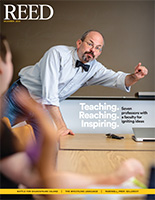
IRIS login | Reed College home Volume 95, No. 4: December 2016
Inspiring Professors (continued)

Photo by Jordi Huisman
Julie Fry [chemistry and environmental studies 2008–] Scott Chair
By Romel Hernandez
The Dr. Arthur F. Scott Chair in Chemistry honors Prof. Arthur “Scotty” Scott [chemistry 1923–79], who served as president of Reed during WWII, built Reed’s first nuclear reactor—out of a pickle barrel—and inspired generations of students.
In a Nutshell: Prof. Fry comes from Michigan, where her hometown’s proximity to Dow Chemical’s headquarters meant the schools provided excellent science education and labs. She wanted to be a scientist and majored in chemistry at the University of Rochester. A Fulbright grant took her to Germany to study solid-state surface chemistry, before she shifted to atmospheric chemistry at Caltech. After graduate school, she worked as a climate policy fellow with the Environmental and Energy Study Institute in Washington, DC. She realized early on that she enjoyed teaching science as much as she enjoyed doing research, and in 2008 jumped at the chance to teach at Reed. She was a visiting professor for a year, then stayed. “I wanted to be somewhere where teaching well is an equal focus alongside doing research,” she says.
Smog Buster: Trained as a research chemist, Fry spent most of her career studying the science of smog before deciding she wanted to do more than just study air pollution—she wanted to do something about solving the problem. A decade after earning her PhD in atmospheric chemistry at the California Institute of Technology and having established herself at Reed, she went back to school. She took a sabbatical over the 2015–16 school year to earn a master’s degree in environmental law at Lewis & Clark Law School.
“I loved being a student again,” she said of her time in law school. “I loved the intellectual challenge of learning a new perspective on environmental problems.”
Climate for Change: Fry’s scientific work has focused mainly on the chemical processes that result in air pollution, specifically the ways nitrogen oxides emitted from car exhaust and factory smokestacks produce particulate haze in the earth’s atmosphere. Because this haze cools the planet, her science and policy interest intersect in what is arguably the biggest policy issue facing the planet—climate change.
“My research is more about how particulates cause climate change than how to combat it,” she says. “But it’s a very important problem, and I feel a responsibility to work on the relevant science.”
And although she jokes that students sometimes refer to her and a colleague she coteaches with as “Professors Doom and Gloom,” she is “cautiously optimistic” that attitudes and policies are moving in the right direction.
“Yes, things are changing quickly,” she says. “But we’re not moving fast enough; we need greater urgency.”
Taking the Air: Fry’s scholarship may be broadening, but she continues to enjoy being out in the field or in the lab, working with students on research. She makes a point of taking her classes out on field trips to take air measurements in the Columbia Gorge and the Brooklyn railyard not far from campus.
“I’m a huge proponent of getting students out there doing independent research,” she said. “I’ve always liked the idea that the world is there to be discovered if you have the right ideas and right tools and ask the right questions.”
Fry also played a pivotal role in developing Reed’s environmental studies program, an interdisciplinary major that draws on biology, chemistry, economics, history, and political science.
“It was something students had wanted a long time, and it very quickly became a strong program,” she says, noting that 8–12 seniors a year now graduate in environmental studies.

LATEST COMMENTS
steve-jobs-1976 I knew Steve Jobs when he was on the second floor of Quincy. (Fall...
Utnapishtim - 2 weeks ago
Prof. Mason Drukman [political science 1964–70] This is gold, pure gold. God bless, Prof. Drukman.
puredog - 1 month ago
virginia-davis-1965 Such a good friend & compatriot in the day of Satyricon...
czarchasm - 4 months ago
John Peara Baba 1990 John died of a broken heart from losing his mom and then his...
kodachrome - 7 months ago
Carol Sawyer 1962 Who wrote this obit? I'm writing something about Carol Sawyer...
MsLaurie Pepper - 8 months ago
William W. Wissman MAT 1969 ...and THREE sisters. Sabra, the oldest, Mary, the middle, and...
riclf - 10 months ago